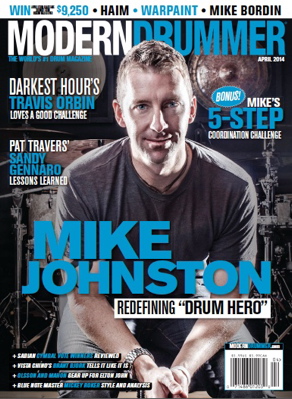April 2014 Spotify Playlist
Welcome to the Spotify Playlist for the April 2014 issue of Modern Drummer magazine. This month’s Playlist includes feature artist Travis Orbin playing some insane stuff with Sky Eats Airplane and Cyclamen, among others; a selection of classic Lee Morgan tracks featuring drummer Mickey Roker, whose work we analyze in the issue’s Jazz Drummer’s Workshop column; Stella Mozgawa gracefully toying with texture and dynamics on several songs from Warpaint’s wonderful self-titled album; a couple of classic-rock nuggets featuring Alvin Taylor; Haim’s Dash Hutton ripping through a live version of the band’s “Honey and I”; our usual selection of cuts from the Critique department; and much, much more.
Editorial: Listen Freely, Buy Selectively
Those of you who’ve followed my editorials over the years, here or in Modern Drummer magazine, might’ve noticed that I have a preoccupation with the pros and cons of technology. Actually, I know very few musicians who don’t; it’s pretty standard fare for anyone who came of age in the rock ’n’ roll era. Blame it on George Harrison’s guitar on the Beatles’ track “I Feel Fine,” reportedly the first artistic use of feedback on record.
Of course, back in 1964 no one was debating whether the Internet helps or hurts musicians more—though to give credit where it’s due, by the beginning of the following decade, the Who’s Pete Townshend was envisioning a future where everyone on earth was connected to a universal “grid” that provided mass entertainment. Pete was also already seeing the potential downfall of such a notion: In his original story line, folks raged against the machine by—gasp!—performing live. One wonders whether they still felt a need to auto-tune the lead singer. Advertisement
I haven’t researched Townshend’s current feelings about commercial music-streaming services like Pandora, Last.fm, and Spotify, but I’ll bet they’re mixed. On the one hand, it’s tough to find complete fault with a system that allows anyone with a smartphone, tablet, or laptop to have a world of music at his or her fingertips—including, in many cases, the nearly complete recordings of thousands of artists who, back in the day, would be lucky to get shelf space at a record shop located anywhere outside of lower Manhattan. On the other hand, the widespread reports of laughably low artist compensation by the streaming services can leave users with a bad taste in their mouth.
I’ve been using Spotify for a while now, and recently I began assembling playlists to correspond with the current issue of Modern Drummer. In terms of providing an immediate way to listen to the music discussed in the magazine every month, it’s tough to beat. Whether you’re trying to decide if you’d like one of the CDs reviewed in our Critique column, attempting to cop the groove of one of the tracks cited in an educational piece, or just wanting to hear that hit record our cover star played on, MD playlists provide you with an immediate aural fix.
But what of those nagging ethical issues? After all, many Modern Drummer readers—not to mention all of us editors—record and market our own music, and we ourselves are among the enormous number of artists who aren’t exactly getting rich from the clicks. At the moment, a solution to the problem seems far off, so here’s what I propose…. Advertisement
Listen freely, and buy selectively. You say you really dug those Tera Melos tracks included in our February playlist? Make sure to support the band the next time it plays near you. Buy a T-shirt from the merch table. Or how about treating yourself to the physical CD of the group’s latest album, X’ed Out—or even the vinyl version. Both are available at Amazon.com, and you’ll not only enjoy a higher level of fidelity than you get from streaming, you’ll be helping the band earn a living wage at this gig we call music making—again, gasp! Better yet, if you live in San Francisco, Hollywood, or Berkeley, California, head on over to the Amoeba Music outlet and get the album there…or at Tunes in Hoboken, New Jersey…or at one of the dozen or so retailers in Portland, Oregon. Yeah, good ol’ Portland—there it’s clearly understood that when people discover music that changes their world, they’re going to want more than just access to cloud-stored files. They’ll want real, three-dimensional objects that they can hold in their hands, pull off the shelf when the mood strikes, and share with their friends. Off the grid. Where the real stuff goes down.
Adam Budofsky
editorial director



